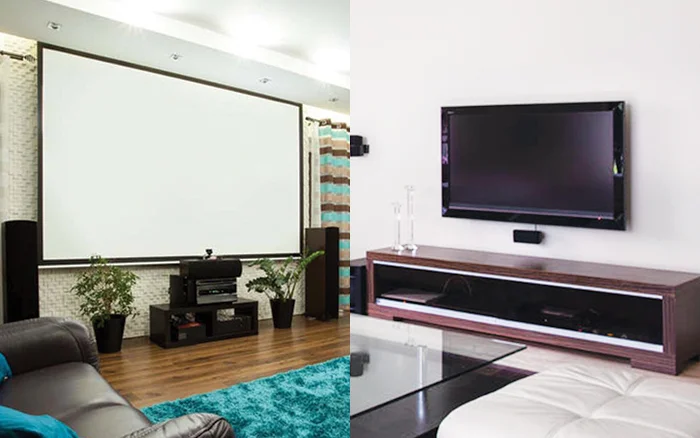
The biggest feature of a projector screen is that the size is not an issue as you could turn an entire wall into a screen if you really want. Some projector models are capable of projecting onto a 300-inch projector screen without compromising the image. so even if all your viewers forget their glasses at home, you’re unlikely to hear anyone complain that the screen is too small. Another advantage of a projector screen is the ability to create the largest images due to which it provides realistic 3D visuals. The projector screen also gives a more comfortable viewing experience. Just like the cinema, the picture is also immersive.
T.V
In terms of brightness, TVs are much more capable of producing higher brightness levels. You can get a bright and vibrant picture in any light. In the contrast section, TVs also have the feature to battle ambient light and heighten perceived contrast. They also provide less maintenance and have a longer lifespan where you don’t have to worry about turning them off after every meeting, which means that you can use them for digital signage in the conference or meeting room.
There is an increase in growth and shift in the home entertainment industry with projector and projection screen combination in high demand. The main reason is flexibility and comfortable viewing experience that projector and projector screens give you with a private room which makes the experience more personal and provides the consumers with the pride of having one’s mini-cinema theatre at home where one can enjoy movies and TV shows with their friends and family, also, consumers now have a choice to separate daily entertainment which they can watch on TV and enjoy movies on a projection screen in high definition picture clarity at their personalized home theatre space.
Comparison
Size
TVs were once greatly behind the projector screen in terms of size, in these changing times the gap is filling, television screen sizes are getting bigger with top of the line specs, high-resolution quality, and affordability. But a high-quality projector screen provides solid brightness, good colour reproduction, and even 4K and 16K resolution compared to T.V. So, while TVs are on the move, a projector screen can still be a better choice.
Brightness
Brightness is a big concern with a projector screen largely because perceived contrast will come down to how dark the room is or isn’t. In the case of a projector screen, most projectors require a dim room to produce a crisp picture like a dedicated media room or home cinema. TVs, on the other hand, easily put out plenty of brightness, especially with LED TVs. Now, brighter isn’t always better. If you’re watching in a dark room, the lower light of a projector screen might be easier on your eyes.
Resolution
4K is the new trend these days, and both large-screen TVs and projector screens can handle it perfectly. With 4K, it can be hard to notice the difference it makes unless you’re watching on a huge screen. Cramming that many pixels into a regular size TV screen make them inherently small and hard to distinguish. Projector screen scores here since the screen is large enough to show the tremendous amount of detail that comes with 4K. With TVs getting bigger every year, this gap is closing, but you’re more likely to have a huge screen with a projector. So, if you’re watching 4K content, you’ll probably want to go that route to enjoy all 4K has to offer.
Sound quality
With projection screens, one has the power to choose like audiophiles can set up a piece of high-quality audio equipment like a surround system or a sound base to have a full cinematic experience which one can’t have in built-in TV speakers.
Emitted Light and Reflective Light.
With bigger LED panels which are available from top brands, the advantage of the screen sizes that were in favour of the projection screens is going away. But as consumers, we have to think if we are ready to face huge LED screens throughout the screen time. LCD, LED and other TV varieties emit blue light, which has harmful effects on our health, especially at night. Long-term effects suggest that high levels of exposure to blue light can damage the eyes. An alternative to blue light-emitting TVs is a projector screen. Blue light is produced by the projector screen as well. But it doesn’t directly hit your eyes as it does in case of T.V display.
Conclusion
In these times consumers check many important factors when it comes to home entertainment like screen size, image quality, sound, product features and impact a product creates on them and their family which might see a shifting trend towards home theatre projector screens. All we can say is, in the end, the one that’s better for you comes down to your personal preference and how you plan to use it. Should you need any more assistance in understanding the concepts of projector screens simply head to our contact section and write us your queries.
- Date - March 26, 2020